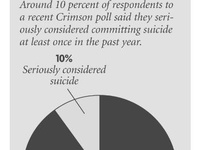The Graduate School of Arts and Sciences also initiated major reforms to its program in 1998 after a spate of three suicides by graduate students was attributed to the school’s high-pressure atmosphere.
While these cases attracted national media attention, the prevalence of severe mental health problems often goes unnoticed until it surfaces in student suicide.
The suicide last December of Winthrop junior Marian H. Smith—a popular and lively figure in the Harvard social scene—served as the most recent reminder of how mental illness can lurk beneath the surface.
In the past 10 years, at least 15 Harvard undergraduates committed suicide.
Between 2000 and 2003, the Harvard University Police Department (HUPD) responded to 14 calls for service classified as attempted suicides.
In a recent Crimson poll, around 10 percent of respondents said they seriously considered attempting suicide in the past year and around 1 percent said they had attempted suicide in that time.
The University has developed a slew of mental health resources, including detailed guidelines for hospitalizing the most severe cases, but some students say the College’s liability concerns are driving its policy more than care for students.
As a result, some students say that Harvard’s main method of dealing with the problem is to avoid dealing with it altogether.
“[An assistant dean of freshmen] was pressuring me to take time off, and I felt like she was telling me, ‘It’s your own problem. We don’t want to have it on our hands,’” says a female 2002 graduate, who suffered from severe depression. “They love it when people take time off when having problems.”
A Leave of Absence
Director of University Health Services (UHS) Mental Health Services Dr. Richard D. Kadison estimates that more than 20 students take time off from school due to mental health problems each year.
Some students with mental health problems choose to take time off in order to recuperate.
But the College can also require that students with mental illnesses get counseling and, if necessary, leave campus.
Kadison says that the College will ask students to take time off when their mental health problems have disturbed their ability to be “functional enough in the community,” either academically or socially.
Several students who struggled with severe mental health problems say that administrators were overzealous in pushing them to voluntarily leave campus and that they felt alienated by the treatment.
Read more in News
Chapel May Remain in Cambridge Permanently















